#sanctions and their effects
Explore tagged Tumblr posts
Text
Chapter 1125 spoilers: Hunger
Also, I put it as an reply/reblog of another person’s post, but remember that the servants and slaves are starving too. They would have been malnourished, regardless, if we go by Kuma and Ginny's story, but if the food supplies to the Celestial Dragons have been cut, then you can believe that those to their workers are disrupted too. And they'll die for it. Whether from a bullet or lack of food. Oda is good with his layers.

#one piece#chapter 1125#one piece 1125#celestial dragons#sanctions and their effects#one piece spoilers#op spoilers#opspoilers#one piece manga spoilers#revolutionary army#chromalami#chromacaps#chromanga
94 notes
·
View notes
Text
Voidborn Woes
Tavia hates the sun
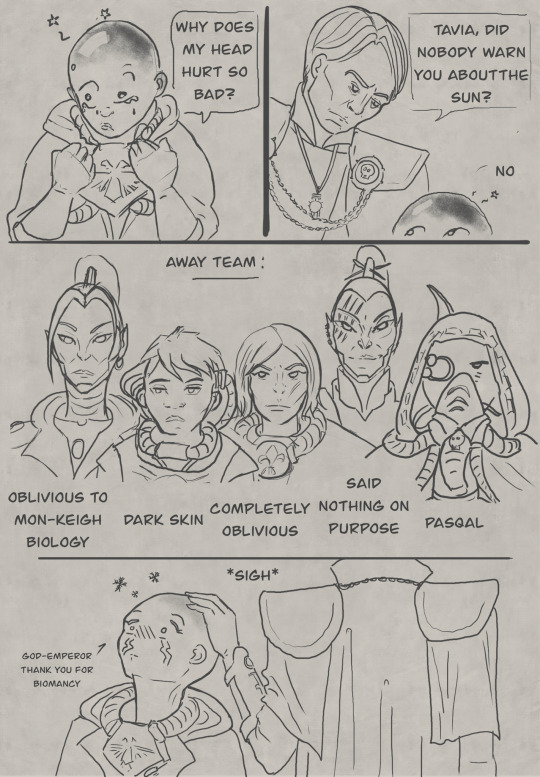
You can tell I draw more xenos than humans
#voidborn psyker with irradience sanctioning side effect#oc: tavia von valancius#heinrix van calox#yrliet lanaevyss#idira tlass#sister argenta#marazhai aezyrraesh#pasqal haneumann#rogue trader crpg
99 notes
·
View notes
Text
So tired of bitches with zero credentials trying to tell me if I'm trans or not. Like, my gender identity has been carefully observed and confirmed by multiple people with PHDs, and I'm not sure you passed middle school. Fuck off.
#i hate cis people#you guys fucking suck#and are fucking stupid as shit#“hormones will ruin your body!”#yeah that's what I want you fucking walnut#“Your gonna mutilate yourself for the woke agenda!”#yeah#tf are you gonna do abt it?#this mutilation is state sanctioned#the process for hrt doesn't fucking magically happen#multiple highly educated people are allowing this to happen#also i fucking wanna#fucks sake#trans#transgender#transblr#trans hrt#gender affirming care#transitioning#“bu-b-but the negative effects!”#like those haven't constantly been brought up to me by medical professionals#go fuck yourself#anti truscum#transmasc#trans pride#trans anger#cishet nonsense#also I fucking hate cis men so much#you guys genuinely never cease to piss me off and disgust me#there are a total of 2 cis men I can tolerate being around
34 notes
·
View notes
Text
It's fortunate my quality of life has improved in other areas because politics-wise I haven't felt this bad since election day, and I spent that night literally praying to die in my sleep if Trump won so

#also just found out today that we sanctioned the ICC so that was just the cherry on top#technically I should have known about that when it was announced in February#but I was still in the crawl-into-a-cave-and-die-stage of grief at that point so absorbed nothing about it#and haven't heard anything about it since I surfaced until now as it came into effect this month
2 notes
·
View notes
Text
we're building imogene lore tonight lads
parts of her timeline were blank bc i just didn't know what tf a sanctioned psyker actually does but 'military' seems to be the big thing I see. so hey! I think I've got it
> born on indiga to 2 indigan praefects > her powers manifest at ~15 years old > while she waits for the black ship, she does what she can to help the praefects, mostly healing since she's just a kid > black ship / sanctioned > back to indiga to officially become a praefect (honestly a huge honor for her) > rogue trader stuff
#also found a sanctioning side effect chart 👀#i'm not gonna roll for one becauseeee#i really like the idea that her vocal cords got fucked so now she's got a lil vox inducer#which makes her timbre a bit mechanical#40k rambling#oc: imogene von valancius
3 notes
·
View notes
Text
we have gottttt to start shaming people for saying shit like "fuck the police includes the identity/fandom/whatever police" like 😭 regardless of ur opinions on exclusionism or fandom discourse u have to be able to acknowledge that those are not even close to actual real life cops
#text#just my opinion ✌️#also inb4 someone misinterprets this YES OBVIOUSLY PEOPLE WHO POLICE PPLS IDENTITIES ARE ASSHOLES#& it can have real life harmful consequences#but i just dont think it is on the same level as the state sanctioned violence committed daily and the enforcement of corrupt#policies that cops get paid and congratulated to engage in and etc. i cant possibly list all the things wrong with cops in tumblr tags sorr#youre gonna have to read a book for that one. POINT IS exclusionism and identity discourse absolutely does have lasting real life effects o#people even if it only takes place online (and sometimes is not in fact confined to the internet only).#but cops are like . an institution thatYOU GET WHAT I MEAN IM NOT EXPLAINING THIS ANY MORE#also if u put someone like. kicking u from a discord server for talking abt weird ships on the same level as the atrocities committed#by Actual Real Life Cops i dont even know what to say to u. 😭 get offline and read a fucking book. PLEASE.#discourse
16 notes
·
View notes
Text
I have seen some contradictory calls to action so I just want to boost the Palestinian BDS National Committee (BNC) calls for boycotts as of Jan 5 2024:
The BNC is currently encouraging consumer boycotts of HP Inc, Chevron (Caltex, Texaco,) Siemens, PUMA, Carrefour, AXA, SodaStream, Ahava, RE/MAX, and Israeli produce.
The BDS movement calls for a complete boycott of these brands carefully selected due to the company's proven record of complicity in Israeli apartheid.
The BNC supports grassroots consumer boycotts of McDonald’s (US), Burger King (US), Papa John’s (US), Pizza Hut (US), and WIX (Israel).
The BDS movement did not initiate these grassroots boycott campaigns but supports them due to these brands’ complicity in Israel’s genocide and apartheid against Palestinians. If these grassroots campaigns are not already organically active in your area, BNC suggests focusing your energies on their encouraged targets, though they specifically endorse escalating the boycott of McDonalds.
Focusing effort on completely boycotting a small number of targets is more impactful than attempting boycotts of every corporation in any way supportive of Israel, and it gives the movement fuel to pressure other corporations.
#free palestine#boycott divest sanction#boycott israel#collective action#ofc nothing wrong with boycotting other corpos too but organization leads to more effective calls for action!
5 notes
·
View notes
Text
Houthi militia imposes strict fuel station restrictions ahead of impending U.S. sanctions taking effect.
In a preemptive move, the Houthi militia has imposed strict regulations on fuel stations in areas under its control, anticipating the implementation of U.S. sanctions on fuel imports set to take effect in early April. Restrictions on Fuel Sales Local sources report that the Houthi militia has instructed fuel station owners in Ibb province, located in central Yemen, to limit the sale of large…
0 notes
Text
I've been keeping it off my face as much as I can on video, but I'm livid about the TikTok ban.
I have about 100,000 followers on that app. I joined during the pandemic. I was lucky to find a community full of incredible people, many of whom I now consider lifelong friends. Because of the community I found on that app, I found space to experiment with my gender presentation. I was able to come out as nonbinary (to feel SAFE ENOUGH to come out as nonbinary) because of that app.
I've seen a few Tumblr posts in which people gloat they never got into TikTok. Good for you. You won't suffer emotionally, and that makes you feel superior. But if you have no concept of what that app has meant for more than 170,000,000 Americans (that's half of all Americans!), many of whom do not have access to community in physical spaces, kindly sit down.
The ban constitutes the largest mass layoff in American history. We will lose billions of dollars in our domestic economy. Over 7 million small businesses are impacted because of the ban. You will feel the effect of that whether or not you were on the app. If you can't grasp the significance of that, again: kindly sit down.
The language of the TikTok ban has set a dangerous precedent for the American government to shutter any tech platforms they deem "dangerous" for arbitrary, undisclosed, nebulous reasons. This will affect Americans' ability to organize, spread information, and protest. They have effectively banned our right to assembly in digital spaces. This is the greatest infringement of free speech that has ever occurred in the United States. If you can't grasp the significance of that, either: kindly sit down.
This is bigger than "never falling for the TikTok craze." This is an enormous governmental overreach sanctioned by our own Supreme Court. It's bigger than teens doing silly dances you can sneer at from your smug high horse.
And if you can't grasp that: Kindly. Sit. Down.
13K notes
·
View notes
Text
Rail freight inducements hope to drive new loads
Several national rail agencies are actively working to increase rail traffic, with a focus on reducing costs and emissions.
This interesting article ties together several efforts by national rail agencies to drum up more traffic. The countries range from Russia to the UK. When you have a national railroad, rather than private enterprise, you can make quick changes that will reduce costs for the kinds of shipments you want. The article focuses on Russia, which is losing lots of cargoes from the Far East headed for…
#Asia to Europe Rail Cargo#Cargo Transportation Europe#Environmental Benefits of Rail Freight#Kazakhstan Rail Network#Logistics#National Rail Agencies#Rail Cargo Competitors#Rail Emissions Reduction#Rail Freight in Kazakhstan#Rail Network Strategic Moves#Rail Traffic Russia#Red Sea Shipping Disruptions#Russia-Ukraine War Effects#Sanctions Impact on Railways#Suez Canal Alternatives#supply chains#UK Rail Fee Waivers
0 notes
Text
as you see the inhuman list of items banned from entry into gaza, you should be keenly aware the partner in israel's murder-suicide pact, the united states, has had an embargo on cuba (effectively doing the same to iran with sanctions too btw) for decades that includes medical supplies.
none of this was lifted for covid 19. both our cruel, barbaric countries will deny the absolute bare necessities for our genocidal economic projects
9K notes
·
View notes
Text
.
This year is an election year for Venezuela ,,,, and I can't help but feel like something is gonna go wrong again
#Meitoswords#I don't like to talk about the situation in Venezuela too much#Most people in the country have started doing their own shit while the government makes everything worst#But damm I really have a bad feeling for this year's “election”#I am desperate for things to get better tho#The more were stuck in this situation with this government the longer it will take us to rebuilt ourselves#Like even if the “”bad guys“” (we know who) get “defeated” the effects are ever lasting#The only way to end this is sanctions or killing we know who/j#Well only half jk#Tbh sanctions are sorta shit. I do think they were implemented thinking of the best case scenario but they've only left us more isolated an#Fucked venezuelans over even more#Without touching the government#I wish I could explain what it feels like for your country to be so isolated but I can't#It's weird idk#It feels like I'm talking about a completely different univers to everyone else#I must keep my hope up but#I'm scared#Even when I've spent most of my life outside from the country I'm scared#Idk why I'm posting this not like this is gonna help lol#We'll see#Vent
0 notes
Text
What does life in North Korea look like outside of Pyongyang? 🇰🇵
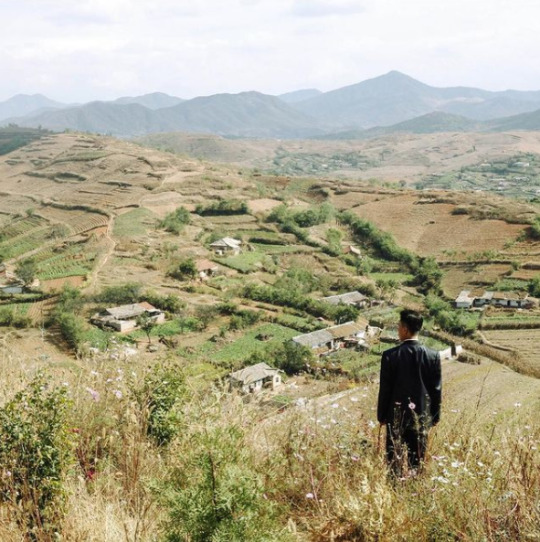
Hey, I'm back again with a very scary "tankie" post that asks you to think of North Koreans as people, and to consider their country not as a cartoonish dystopia, but as a nation that, like any other place on earth, has culture, traditions, and history.
Below is a collection of pictures from various cities and places in North Korea, along with a brief dive into some of the historical events that informs life in the so-called "hermit kingdom."
Warning: very long post
Kaesong, the historic city
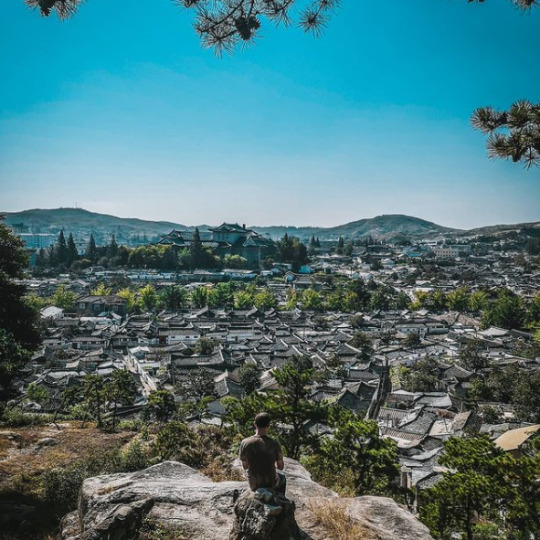
Beginning this post with Kaesong, one of the oldest cities in Korea. It's also one of the few major cities in the DPRK (i.e. "North Korea") that was not completely destroyed during the Korean war.
Every single city you'll see from this point on were victims of intense aerial bombardments from the U.S. and its allies, and had to be either partially or completely rebuilt after the war.
From 1951 to 1953, during what has now become known as the "forgotten war" in the West, the U.S. dropped 635,000 tons of bombs over Korea — most of it in the North, and on civilian population centers. An additional 32,000 tons of napalm was also deployed, engulfing whole cities in fire and inflicting people with horrific burns:
For such a simple thing to make, napalm had horrific human consequences. A bit of liquid fire, a sort of jellied gasoline, napalm clung to human skin on contact and melted off the flesh. Witnesses to napalm's impact described eyelids so burned they could not be shut and flesh that looked like "swollen, raw meat." - PBS
Ever wondered why North Koreans seem to hate the U.S so much? Well...
Keep in mind that only a few years prior to this, the U.S. had, as the first and only country in the world, used the atomic bomb as a weapon of war. Consider, too, the proximity between Japan and Korea — both geographically and as an "Other" in the Western imagination.
As the war dragged on, and it became clear the U.S. and its allies would not "win" in any conventional sense, the fear that the U.S. would resort to nuclear weapons again loomed large, adding another frightening dimension to the war that can probably go a long way in explaining the DPRK's later obsession with acquiring their own nuclear bomb.
But even without the use of nuclear weapons, the indiscriminate attack on civilians, particularly from U.S. saturation bombings, was still horrific:
"The number of Korean dead, injured or missing by war’s end approached three million, ten percent of the overall population. The majority of those killed were in the North, which had half of the population of the South; although the DPRK does not have official figures, possibly twelve to fifteen percent of the population was killed in the war, a figure close to or surpassing the proportion of Soviet citizens killed in World War II" - Charles K. Armstrong
On top of the loss of life, there's also the material damage. By the end of the war, the U.S. Air Force had, by its own estimations, destroyed somewhere around 85% of all buildings in the DPRK, leaving most cities in complete ruin. There are even stories of U.S. bombers dropping their loads into the ocean because they couldn't find any visible targets to bomb.
What you'll see below of Kaesong, then, provides both a rare glimpse of what life in North Korea looked like before the war, and a reminder of what was destroyed.
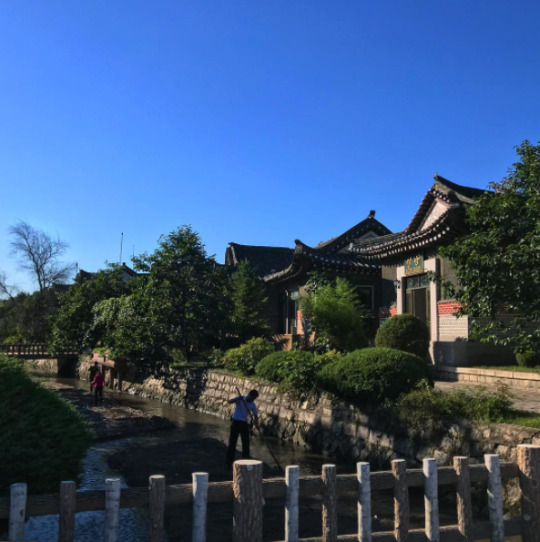
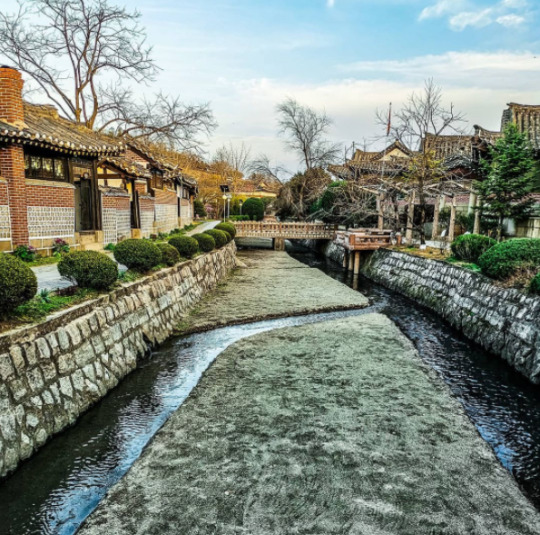
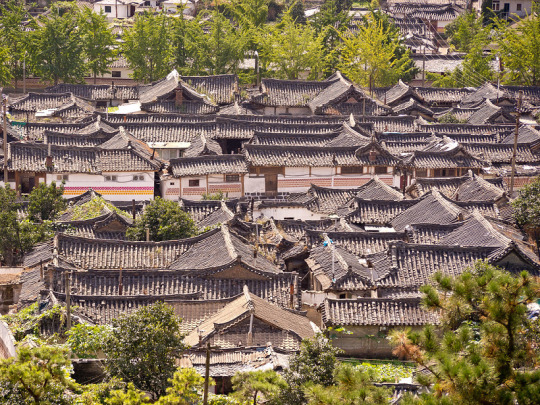
Kaesong's main street, pictured below.
Due the stifling sanctions imposed on the DPRK—which has, in various forms and intensities, been in effect since the 1950s—car ownership is still low throughout the country, with most people getting around either by walking or biking, or by bus or train for longer distances.
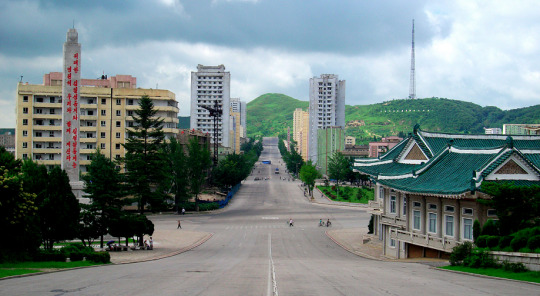
Kaesong, which is regarded as an educational center, is also notable for its many Koryŏ-era monuments. A group of twelve such sites were granted UNESCO world heritage status in 2013.
Included is the Hyonjongnung Royal Tomb, a 14th-century mausoleum located just outside the city of Kaesong.
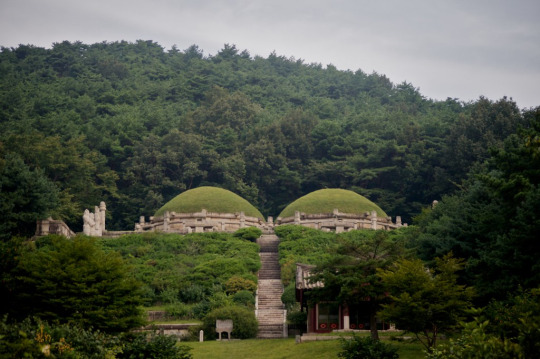
One of the statues guarding the tomb.
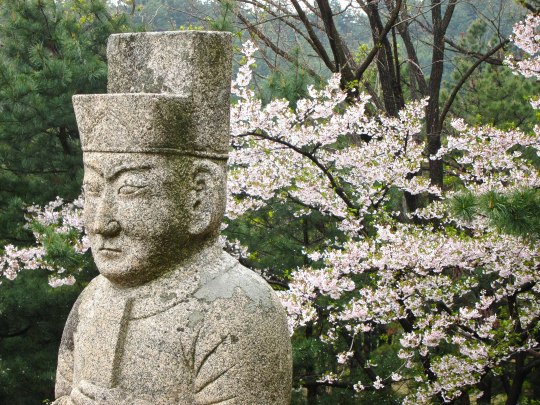
Before moving on the other cities, I also wanted to showcase one more of the DPRK's historical sites: Pohyonsa, a thousand-year-old Buddhist temple complex located in the Myohyang Mountains.
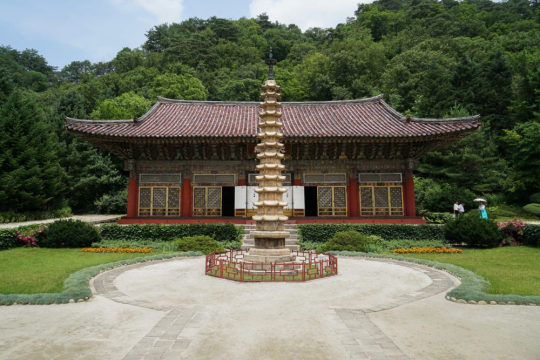
Like many of DPRK's historic sites, the temple complex suffered extensive damage during the Korean war, with the U.S. led bombings destroying over half of its 24 pre-war buildings.
The complex has since been restored and is in use today both as a residence for Buddhist monks, and as a historic site open to visitors.
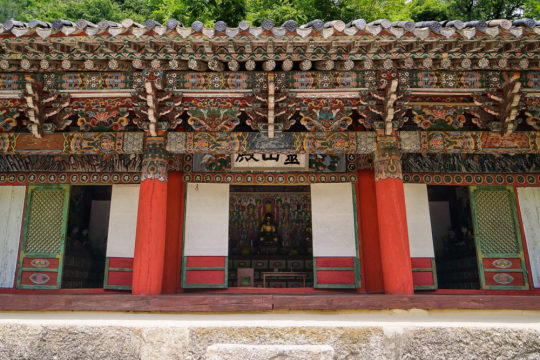
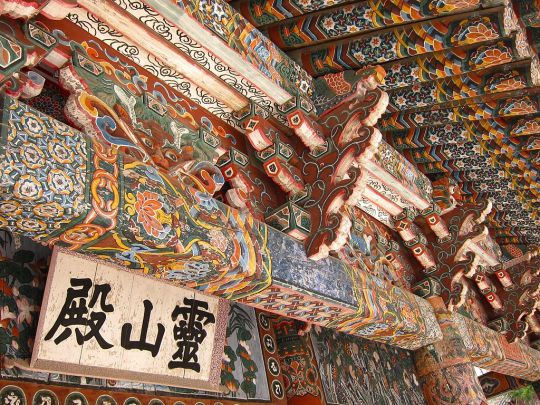
Hamhung, the second largest city in the DPRK.
A coastal city located in the South Hamgyŏng Province. It has long served as a major industrial hub in the DPRK, and has one of the largest and busiest ports in the country.
Hamhung, like most of the coastal cities in the DPRK, was hit particularly hard during the war. Through relentless aerial bombardments, the US and its allies destroyed somewhere around 80-90% percent of all buildings, roads, and other infrastructure in the city.
Now, more than seventy years later, unexploded bombs, mortars and pieces of live ammunition are still being unearthed by the thousands in the area. As recently as 2016, one of North Korea's bomb squads—there's one in every province, faced with the same cleanup task—retrieved 370 unexploded mortar rounds... from an elementary school playground.
Experts in the DPRK estimate it will probably take over a hundred years to clean up all the unexploded ordnance—and that's just in and around Hamhung.
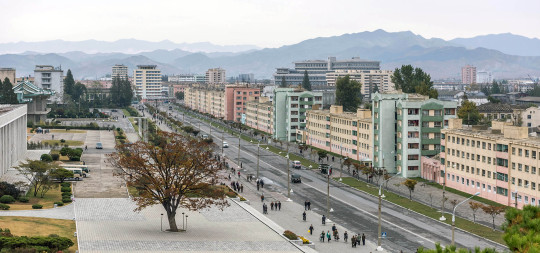
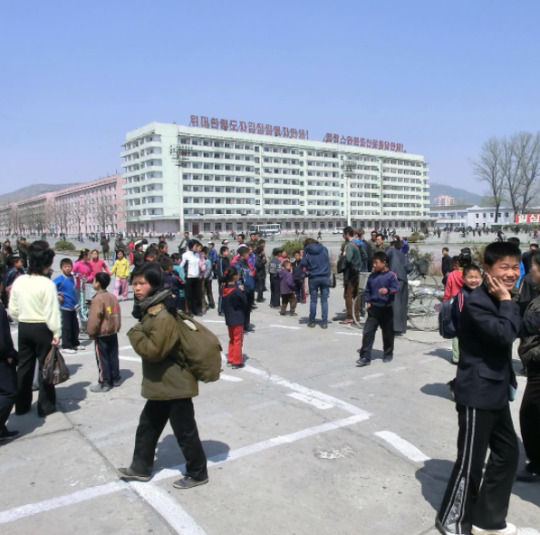
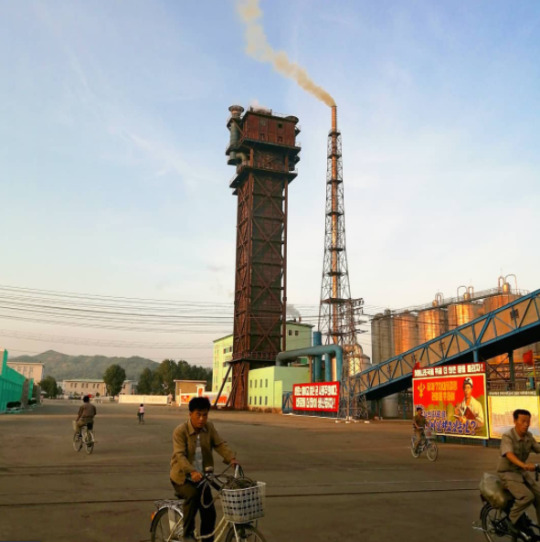
Hamhung's fertilizer plant, the biggest in North Korea.
When the war broke out, Hamhung was home to the largest nitrogen fertilizer plant in Asia. Since its product could be used in the creation of explosives, the existence of the plant is considered to have made Hamhung a target for U.S. aggression (though it's worth repeating that the U.S. carried out saturation bombings of most population centers in the country, irrespective of any so-called 'military value').
The plant was immediately rebuilt after the war, and—beyond its practical use—serves now as a monument of resistance to U.S. imperialism, and as a functional and symbolic site of self-reliance.
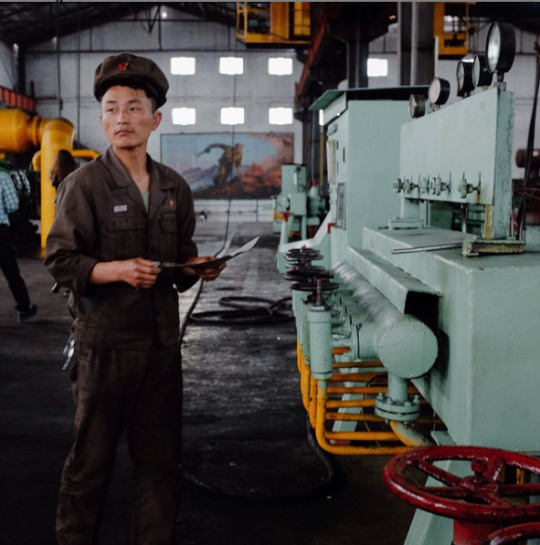
Chongjin, the third largest city in the DPRK.
Another coastal city and industrial hub. It underwent a massive development prior to the Korean war, housing around 300,000 people by the time the war broke out.
By 1953, the U.S. had destroyed most of Chongjin's industry, bombed its harbors, and killed one third of the population.
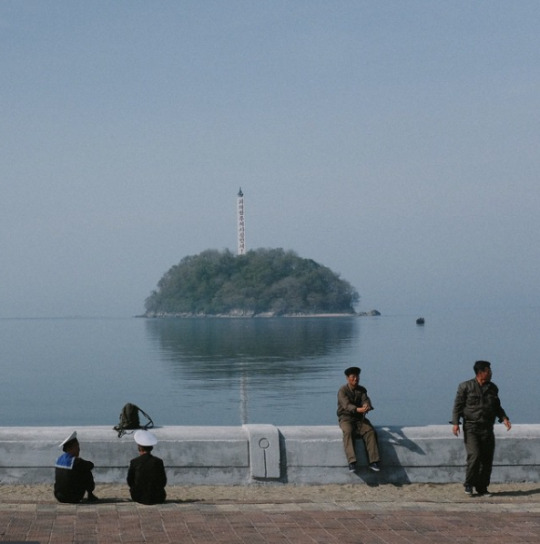
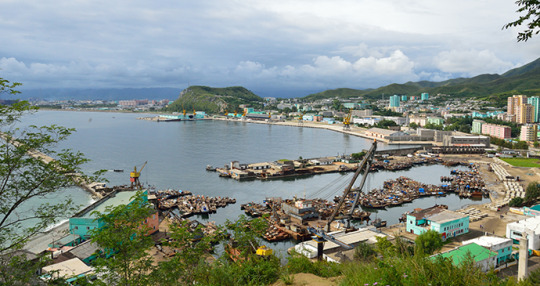
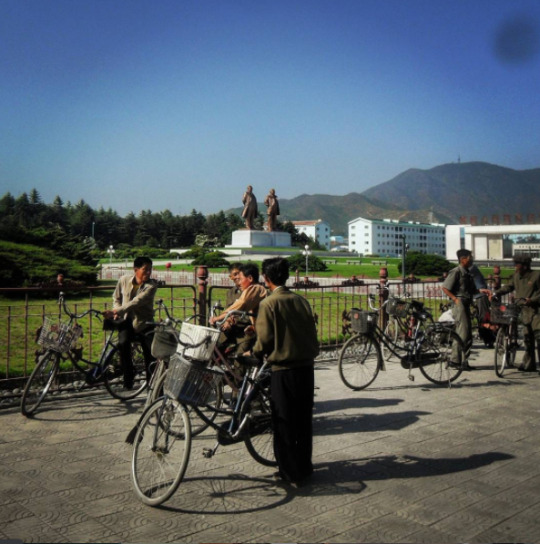
Wonsan, a rebuilt seaside city.
The city of Wonsan is a vital link between the DPRK's east and west coasts, and acts today as both a popular holiday destination for North Koreans, and as a central location for the country's growing tourism industry.
Considered a strategically important location during the war, Wonsan is notable for having endured one of the longest naval blockades in modern history, lasting a total of 861 days.
By the end of the war, the U.S. estimated that they had destroyed around 80% of the city.
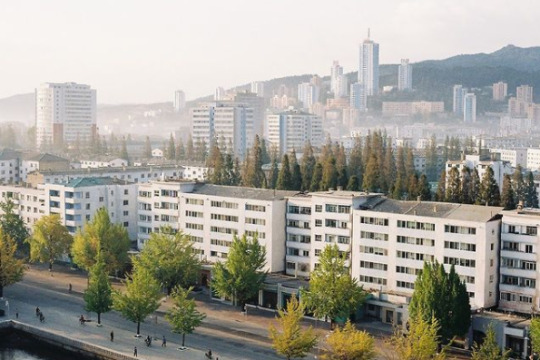
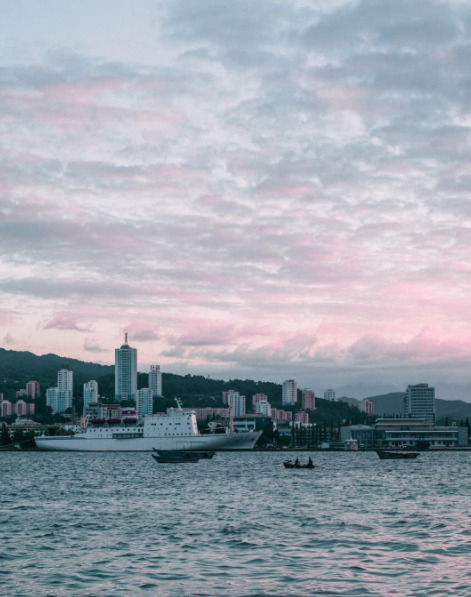
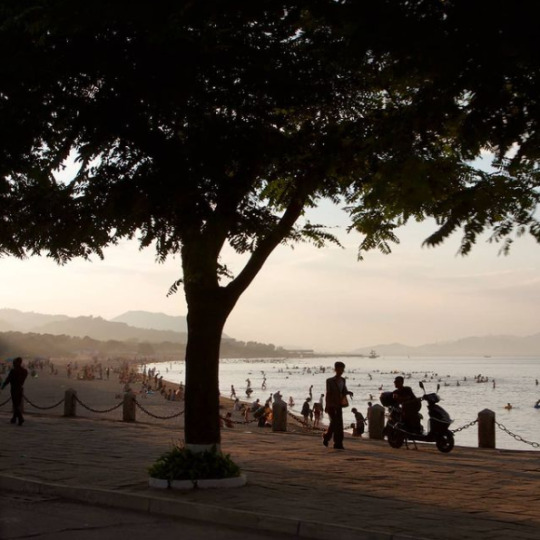
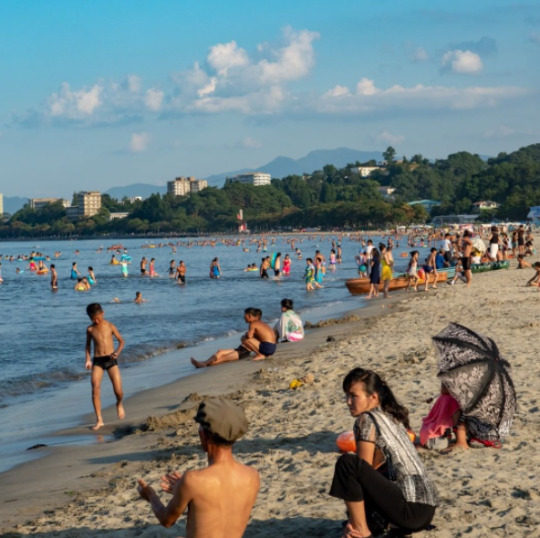
Masikryong Ski Resort, located close to Wonsan. It opened to the public in 2014 and is the first, I believe, that was built with foreign tourists in mind.
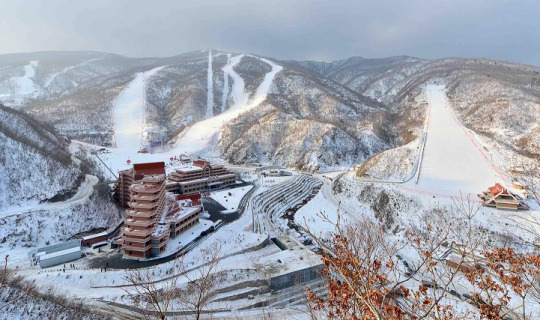
Sariwon, another rebuilt city
One of the worst hit cities during the Korean War, with an estimated destruction level of 95%.
I've written about its Wikipedia page here before, which used to mockingly describe its 'folk customs street'—a project built to preserve old Korean traditions and customs—as an "inaccurate romanticized recreation of an ancient Korean street."
No mention, of course, of the destruction caused by the US-led aerial bombings, or any historical context at all that could possibly even hint at why the preservation of old traditions might be particularly important for the city.
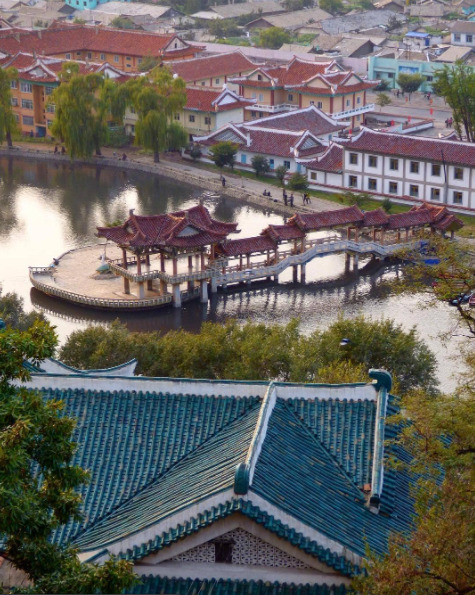
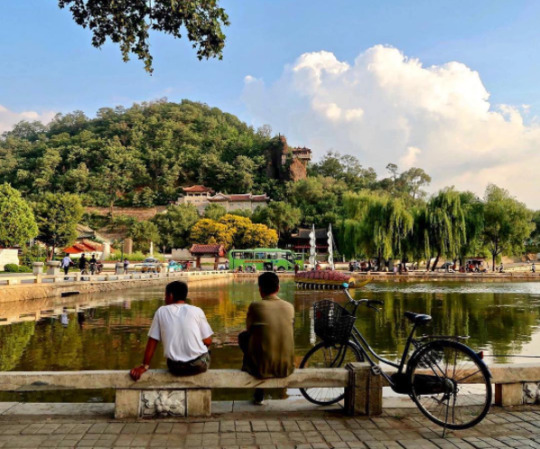
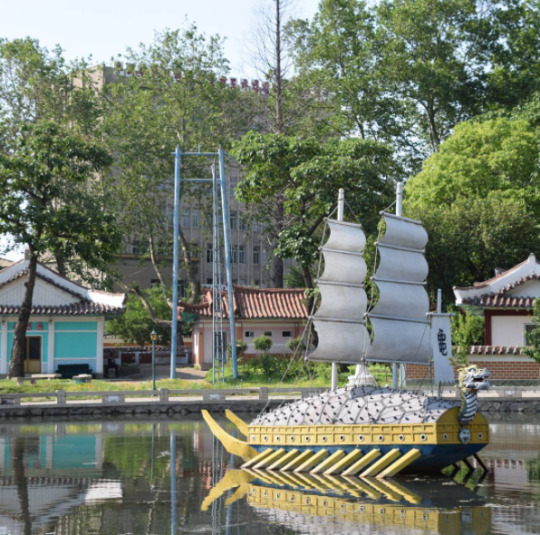
Life outside of the towns and cities
In the rural parts of the DPRK, life primarily revolves around agriculture. As the sanctions they're under make it difficult to acquire fuel, farming in the DPRK relies heavily on manual labour, which again, to avoid food shortages, requires that a large portion of the labour force resides in the countryside.
Unlike what many may think, the reliance on manual labour in farming is a relatively "new" development. Up until the crisis of the 1990s, the DPRK was a highly industrialized nation, with a modernized agricultural system and a high urbanization rate. But, as the access to cheap fuel from the USSR and China disappeared, and the sanctions placed upon them by Western nations heavily restricted their ability to import fuel from other sources, having a fuel-dependent agricultural industry became a recipe for disaster, and required an immediate and brutal restructuring.
For a more detailed breakdown of what lead to the crisis in the 90s, and how it reshaped the DPRKs approach to agriculture, check out this article by Zhun Xu.
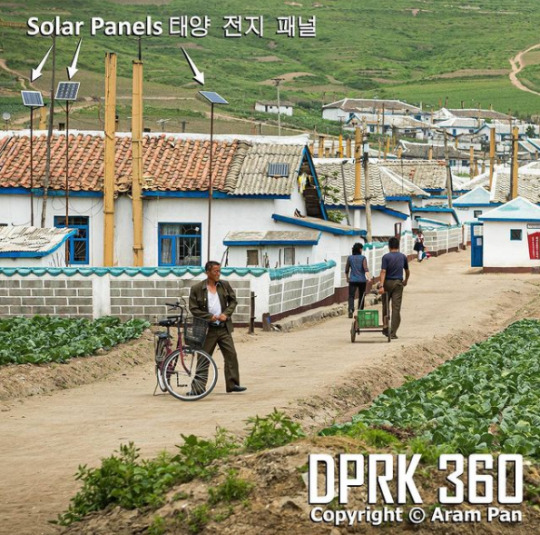
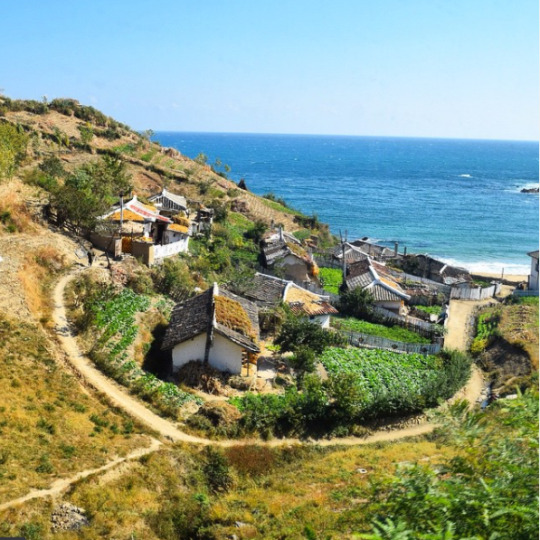
Some typical newly built rural housing, surrounded by farmland.
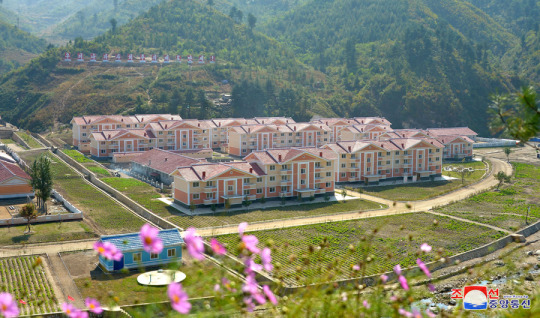
Tumblr only allows 20 pictures per post, but if you want to see more pictures of life outside Pyongyang, check out this imgur album.
#dprk#north korea#i've had this post unfinished in drafts for almost a year#also sorry about the spelling and potential formatting issues it's a nightmare to edit at this point#it was literally just meant to be a collection of picture and then the writing just sort of happened#enjoy the brief heritageposts history lesson i guess
7K notes
·
View notes
Text
this is your daily reminder that it's been over 65 years since cuba overthrew batista's US-backed fascist dictatorship and the US is STILL keeping cuba in extreme poverty using an "embargo."
back in the 1950s, using US funds and US-trained soldiers, batista (not castro) removed most of cubans' rights, including the right to strike, censored all media, and used secret police to torture and publicly excute anyone who protested his dictatorship. In a document released by the CIA in 2005, it stated as many as 20,000 people were killed. In return, batista gave control of most of the arable land to the US. during the revolution, this land was reclaimed and redistributed, which means that USAmericans can now sue anyone who "traffics" in this "confiscated" property.
Despite US sanctions being an "embargo," the US also fines foreign companies for doing business in Cuba, meaning it's effectively a blockade. Despite Obama lightening some of these restrictions, Biden has done little to undo the tightened policies from Trump's administration.
In November, the UN called for the 31st time (!!!) for the US blockade to end, supported by 187 countries and opposed only by the US and its bestest buddy (I'll let you guess who).
Cuba has been in economic crisis for years. Monthly income in Cuba is $30-60. There is very little food and it is hard to purchase anything like toiletries, clothes, and over-the-counter medicines. Domestic production is down because they don't have the resources to sustain them. The US has been intentionally impoverishing and starving Cuba for decades, and they continue to make it clear that it is not going to stop.
So, yeah. US democracy is a joke, end the US blockade on Cuba, and fuck genocide joe.
#the americans arent gonna like this one yall#free cuba#end the US blockade#end the US embargo#hands off cuba#hands off yemen#free palestine#free puerto rico#end US imperialism#stop the US war machine
6K notes
·
View notes
Text
Dear Brother
Kinktober Day 14: Incest Yandere brother x male reader CW: Incest, noncon, memory alteration, mind manipulation, possessive yandere, protective yandere, general yandere behavior, versatile reader, anal sex, drugging, sedatives, aphrodisiacs, collaring, murder, Stockholm syndrome, major character death, reader's own cum as lube, masturbation, discrimination against those without powers, dead dove: DO NOT EAT Word Count: 3.8k (This is dark. Sorry for any errors, I did not have it betaread. I hope there are some who will enjoy this.)
The meteor that crashed to the ground generations ago came with it a particularly invasive pathogen. A virus that infected all of humanity, changing the DNA of everyone on Earth, though a large portion of people remained asymptomatic with recessive changes.
Those with symptoms displayed mutations. They varied wildly from animal traits, elemental powers, enhanced strength, super speed, extra limbs, and many others.
Over many years, the DNA that the virus altered became increasingly prominent as mutations were inherited and compounded. Asymptomatics were rarer and rarer. Currently, they made up only 15 percent of the population.
A small portion of people used their extra human abilities for evil, and others became government sanctioned heroes to fight them.
The people who had mutations become highly sought after and fetishized. More laws came into effect to protect them from villains and criminals who would traffic them.
You were a mutationless nobody living in this society.
A brand new law had established a curfew for all people without strong enough mutations. They couldn't go out unless someone with a strong ability was with them.
Another law was that those with no abilities couldn't live alone.
Because of this, you became wholly dependent on your older brother, Drew.
Your older sibling was entirely fine with this arrangement. He had a love for you that wasn't entirely brotherly, though you didn't suspect anything. It seemed to you that his overprotective behavior was the product of being an older brother to someone without a mutation in a world that conditioned people to think of those like you as defenseless. You thought yourself fairly lucky. You weren't forced into an abusive or restrictive marriage or roommate situation because you had Drew. He was always happy to chaperone and escort you.
When he wasn't too busy with his work as a hero. Drew had moved the two of you to a small town due to a lower crime rate and desire to keep you safe and spend as much time with you as possible. It was also to isolate you from any potential suitors. But... you didn't really need to know about that... You had gotten too chummy with people online through various social media and dating websites who lived a bit too close for comfort in the large city you had lived in previously. It was getting burdensome finding them, intimidating them, burying more than one body when they wouldn't get the hint that you were spoken for. That had been rare, though.
If he really needed to, he could use a power no one knew he possessed. He could remove and replace memories. It was a tedious task, requiring a lot of time and energy, and not all minds were susceptible. Even if they were, it couldn't normally be used multiple times on the same person. Which is why he couldn't just make you forget or hate them. Luckily, most people were easily intimidated by Drew. He was tall and muscular, which was enough in some cases, but he also could move things with his mind and produce a psychic barrier around his skin to make him indestructible.
The quieter smaller town was kinda nice, but you were rather bored. Especially when Drew had to do his patrols. He made sure he worked more in the early morning and afternoon since you always liked to be up at night playing video games and going for walks at night with him. Sometimes, he'd take you out to eat at a 24/7 diner that the town had.
He thought of those outings as dates and considered himself to be courting his defenseless brother.
Your brother always ordered ice cream for you to share. Drew loved to watch you eat it, sometimes biting his lip as you so lewdly licked the cold confection from your spoon. It made his cock twitch in his pants. How he wished you were licking his manhood like that. Eager to get every drop of his cum.
The last time you were at the diner you had caught him staring at you with an odd expression.
"What's with that weird face?"
"Oh, uh... I just had a brain freeze."
You had chuckled at him and went back to eating. How he longed for the day when he could tell you how he really loved you. Hopefully it would be soon, but he just didn't know how to broach the topic.
He had let you walk in on him wanking a few times. But all it achieved was you turning red and scrambling out of the room with an immediate apology followed by you pretending that nothing had occurred. Nothing like the pornos.
The other day, you had been comfortable enough to fall asleep on the couch as the two of you watched a movie. He had been admiring your peacefully sleeping form when you slouched over and leaned on his shoulder. He could hear your breathing and felt your drool as it ran down his arm.
It gave him an instant hard-on that he had to address. You had been a busy bee and cleaned the whole house earlier before cooking dinner. You were totally wiped out. Though even on an easy day, you were known for sleeping deeply. Drew carefully shifted the shorts he had been wearing so his large cock was sticking out through the leg and cautiously jerked himself off while imaging you cuddling and clinging to him after a long day.
He had cum so hard that a bit had landed on your lips. He was worried you would wake up, but you remained out like a light as he gently massaged it into your lip like lip gloss.
After that, he had "accidentally" fallen asleep right beside you. He couldn't very well wake a sleeping angel by moving.
That had been well over a month ago, and his desire for you had only grown. He had taken to stealing your underwear and keeping a pair under his pillows so he could sniff them before bed and dream about you.
He knew one day soon he'd have you in every way.
But there was a setback.
His schedule had shifted temporarily while he was on an assignment to help take down a super villain coalition. For two weeks, he was barely home at all, and a vermin had slipped in.
He came home one day to find you on the porch chatting with some piece of absolute filth who kept brushing his hand against yours.
When he left and you came back inside, Drew was holding back serious rage. You had a look on your face that told him all you needed to know. He didn't even have to question you about who it was. You just kept gushing about him.
"That was Len! He's such a sweetie! He saw me on the porch a few days ago when he was walking by and noticed I was glum."
The way you swooned and gushed made Drew's stomach lurch.
"He's so cool! I'm sure you'll like him. He isn't a hero, but his mutation is awesome. He can spontaneously make fire."
Drew noticed you twiddling your fingers in the way you only did when you were brimming with joy. Would that piece of trash know details like that about you!?
Your brother immediately began planning for Len's demise. This was beyond intimidation, threats, and memory alteration. He lived far too close and touched your perfect weak hands with his disgusting grubby ones. Drew knew exactly how he'd do it. He'd infiltrate Len's home and use his telekinetic abilities to cause him to have a stroke. Then he'd burn the house down. It wasn't unheard of for people's mutations to run out of control.
On the night that Drew planned to end Len, you had been texting Len. Even though it was late, he had invited you over because he was playing a new game that he thought you might enjoy together. If you wanted, he'd leave the door unlocked so you could come in. He knew knocking and waiting made you anxious.
He was such a good listener. He would have come over and walked with you, but it was such a short walk, and you didn't want to wake up Drew. Besides, his house was just a few down from yours. If you ran, you could be there in under a minute. And, honestly, no one took these curfew laws seriously in small towns.
You rushed over as fast as you could and nervously opened the door and stepped inside.
"Dr-Drew? What are you-?"
The question was left unfinished as your gaze lowered to Len laying motionless at your brother's feet. Drew's eyes went wide, and his mouth agape when he noticed you. He obviously had not expected you to walk in on his activities. This was just like when you had just turned 20 and you had caught him killing your parents because they had wanted to convince you to go to an isolated island for the mutationless because they wanted you to feel normal.
He had wiped the events from your brain, made you think they had abandoned you both long ago, and finished by making you think he was the older brother so you'd accept him taking care of you a bit more easily when in reality he was a year younger.
But unlike last time, he couldn't erase Len or what you had witnessed. After doing it once, and so extensively, you were inoculated from it.
Your mind was reeling, struggling to piece together an explanation for what you were seeing. You took a few steps back, planning to just run away and hope you woke up from whatever awful nightmare this night was shaping into. But the door slammed shut before you could finish turning around.
"Y-you have to understand! He was going to steal you away... He didn't deserve you. No one does! Except me."
Drew used his abilities to make you slowly float towards him. The look on his face could only be described as deranged.
"I'm so sorry you had to see this. It was supposed to look like an accident..."
You squirmed in his psychic hold as you began sobbing. Your brain finally registered that your brother killed the man you had started to fall in love with. Nothing made sense.
Once his power brought you to him, he wrapped one arm around you tightly and used his free hand to pull a tiny spray capsule up to your face from his utility belt.
He spritzed you just once, and within a few seconds, you were fast asleep. With you taken care of for the moment, Drew could safely get back to the business at hand.
Your subconscious mind must have still been in denial because you found yourself in a dream pounding Len's muscular ass. He was riding you, and you found yourself bucking into his tight hot hole. In reality, your brother had been watching you sleep and decided to rub your crotch. He figured you needed the stress relief, and if you woke up, maybe the pleasure would prove he was just trying to make you happy.
It made sense in his warped mind.
He was originally just going to jerk you off, but when you got fully hard under his touch... he couldn't resist the urge to ride on it. Drew lubed it up and sank himself down on it. This was perfect, he thought. Your first official act as lovers. It would definitely make you forget about that sack of garbage he just took out.
The look on your face as you drooled in your sleep and let out little lewd gasps went straight to his dick and had him cumming in no time. He briefly lifted off of your cock long enough to smear his semen on it before lowering himself again.
You were fucking his cum into him and it would be mixed with your own once you climaxed. The thought made his stomach flutter as blush crept across his face.
Drew knew you were close, your moans had gotten louder and you had started bucking your hips into him. He was amazed you hadn't woken up yet. Though you had always been a deep sleeper and the stuff he sprayed you with was pretty heavy duty. Your eyes fluttered open as you shot your load inside him and moaned out the name Len.
L e n.
It was exactly the wrong thing to say. Your brother, who had never raised a hand to you, slapped you hard across the face.
"That loser is DEAD!! Len is a fucking corpse smoldering in the ashes of his house!"
You were shaking as you stared up at him, still confused about what was going on. Your brain was full of fog and struggled to piece together the events that transpired last night and the fact that your brother was on your dick and angrily yelling in your face.
When he realized the fear in your eyes, he got off of you and pulled you close.
"I'm sorry. I'm so sorry. I know it's not your fault. You're so innocent, and he wormed his way into your mind like the greedy parasite he was."
He kissed your cheek gently where he had struck you.
"Just... try not to say his name, okay? You gotta forget about him. It isn't healthy to linger on toxic people like that."
He got up and made his way to the bathroom connected to his room.
"I bet a bath will make us both feel a little more relaxed."
You were pretty sure that you would never be relaxed again for the rest of your life. Your brother was a villain and you had no idea what he was capable of doing to you. The sibling you had depended on killed Len, forced himself on you while you were sleeping, and slapped you.
Since he was busy making a bath, you thought you'd take the chance to leave. You pulled up your pants and crept past the bedroom door and down the stairs. When you reached the bottom, you stared in dismay at the blockade he had put in front of the door. There was no other choice but to turn around. But as you did so you slammed right into the chest of your sibling, who was staring down at you darkly.
"I just came downstairs for a sn-snack."
You were trembling and hoped he bought it. You knew he had when his face softened.
"Oh, well after our bath I'll make us a late night snack."
He grabbed you by the hand and led you back upstairs.
"This will be our first bath together! I'm really excited."
The last thing you wanted to do was to bathe with this monster. But there was no escaping it.
"Haha I guess I'm excited in more than one way!"
You glanced over and saw what he meant. His cock was fully erect.
"I-I'm too shy to bathe together!"
"Don't be silly! We're lovers now and we both really need this."
He picked you up like you weighed nothing and took you into the tub with him. He sat down and positioned you on his lap facing towards him. His erection jabbed at you from below. It made you cringe and curl in on yourself.
Despite the bubbles and warm water, you had never felt so filthy.
"You're still so tense, but big bro will make everything better~"
He groped and massaged your ass before starting to rub your hole. You flinched.
"You have to relax to make this easier."
Eventually, he pressed a finger into you.
"Please sto-"
You were cut off by involuntarily moaning as he hit a special spot inside you.
"Oh, you liked that, didn't you? Made you sound so needy~"
As he kept attending to that place inside you, working his way up to three fingers, your mind got more clouded and distracted, and your body went limp and relaxed.
"Sto-ahhh AAAHHHH!!"
Your hole clenched tightly as you spilled your load on his chest.
Before you could catch your breath he slowly replaced his fingers with his cock. Careful not to hurt you as he slowly eased you down on his entire length.
You were already hard again despite being so sensitive. His hard cock entered you with a bit of pain despite the previous stretching.
For Drew, it was bliss. Heaven. His cock was wrapped in the warm paradise that was his beloved brother. Finally, he was with you in the way his heart yearned to be. He should have just done this the second the two of you had moved out here.
The slight bit of pain you had initially felt faded at the feeling of him battering your insides. His tip perfectly kissed that spot inside you, your resolve being fucked away with each thrust.
Drew moaned your name as he came in you all too soon.
"My cum is in you. My cum is in you. My cum is in you. Mycumisinyou."
He never lost his hard on and kept right on making love to you, his precious brother, without stopping for a second. As his movements intensified, the lavender scented water splashed against the two of you.
"I-I knew I could make it all better!"
You prattled on incoherently as drool pooled from the corner of your mouth.
"You're right. We should let our actions do the talking"
Drews lips dominated yours as he kissed you deeply, nibbling on your lower lip and licking up your drool as he made out with you. As both of you came once more, he slid his tongue into your mouth and rubbed it against yours.
He pulled away and kissed your forehead. Your brain was foggy, and your body was exhausted after all you had been made to endure.
"I guess I should clean us up before the water goes completely cold. Don't worry, we can do that some more after we've rested up, okay?"
You muttered something, but you didn't know what you were saying or even what you were responding to.
That didn't stop Drew from hearing whatever he wanted to though.
"Yeah, we can still make out in bed before we fall asleep!"
Drew cleaned you off then sat you down on his bed after dressing you. Then he ran downstairs and came back up with some cookies.
"You wanted a snack right?"
You nodded sheepishly and nibbled a few to maintain the lie you told earlier. When you finished you went to brush your teeth before bed.
You couldn't look at yourself in the mirror. You were ashamed you had let your brother violate you in such a manner. You were ashamed you were brushing your teeth like it was a normal night. Maybe you could escape or call for help when he was working. It was already early in the morning. His schedule had returned to normal, and he would be back to work in a few hours. You just had to play along and get into bed with him...
The trembling of your body didn't betray your fear, Drew just assumed you were cold and held you protectively under the blankets. He stroked your side gently. It would have been comforting before you knew he was a murderer. Now, it only made you tense. Though you did manage to grab a few moments of uneasy rest.
Upon waking, you realized you were oddly calm. Tranquil. When you had finally fallen asleep, he had sprayed you with another substance from his utility belt.
This time, it was just something heroes used to calm people down. Villains and sometimes people in shock. It was pretty harmless, so if he had to keep you mildly sedated with it, he could. Though he hoped he could adjust you to your new circumstances with it and then eventually wean you off. It made you a little calmer, happier, and more accepting of your situation.
You also found yourself collared. The inside was a soft fabric and the outside a rough material. It was locked to a long chain that was mounted to the wall. You could reach the restroom and the minifridge he had by his bed. A minifridge stocked with all your favorite snacks and cold meals, a mounted chain, a custom collar in your favorite color... How long had he planned for this possibility?
There was definitely anger and grief, but they felt much more muted than they should have been.
The first year or so as your brother's boyfriend was a bit messy. Despite the calming drug, you still had emotional outbursts and anxiety. But your brother understood. He wasn't going to abandon you just because you were a bit moody or said hurtful things sometimes.
He endured and the two of you got through. It didn't hurt that he had stockpiled illegal aphrodisiacs confiscated from human traffickers. They made a target especially horny for the first person who's DNA they were exposed to. Whenever he used it, you were hard and needy to the point of crying, and only his dick could make it any better.
It was a great breakthrough when your body finally got hard from his touch without the help of any drugs at all.
And then you started kissing him and leaning on your big strong brother whenever you got lonely from your isolation. He was the only person you were allowed to have any contact with, and the craving for touch became too unbearable.
Your broken mind slowly justified it and changed your perspective on how you saw Drew. The only other option was going insane.
He was just looking out for you and keeping you safe from evil people. It was all for your own good. He took care of all of your needs. Cuddled you, kept you safe, provided you with games and food, and he was always happy to give you his cock or hole whenever you needed it, even when he was tired from work. If you had trouble sleeping, he'd even gently slip his dick into you and rock you to sleep with the thrusts.
It had, at long last, gotten to the point where he could take you outside on dates again with no fear at all that you'd try to escape him. In fact, you'd cling to his arm for dear life no matter where you went.
Drew was so happy. Now everyone could see that you two were the perfect couple.
#yandere x reader#yandere boyfriend#male yandere#male reader#yandere scenario#yandere fic#yandere sibling#yandere brother#My OCs#My OC Len#My OC Drew#Male Yandere x Male reader#Kinktober#Kinktober 2024
1K notes
·
View notes
Text
it is so frustrating to watch people in my own family not give a shit about bds!!
hopefully ppl are familiar with this but it’s good to share repeatedly bc it can be memorized the more often it’s seen

Watching peoples incapability and refusal and excuses not to follow bds is genuinely shameful and you should feel bad about yourself if you’re so incompetent and hedonistic that you can’t give up your little treats or take an extra 10 seconds to look at where your produce comes from
#ppl with disney plus subscriptions lmao the fuck are you watching on there??#those flavourless marvel movies???#anyways I don’t believe shame is an effective method of getting people to follow BDS but damn….#free palestine#boycott divest sanction
99 notes
·
View notes